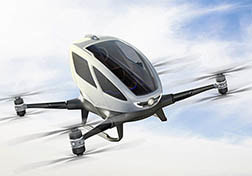
TOKYO- Choked road traffic conditions in three mega cities prompted global ride-hailing platform Uber to select India among the first five shortlisted finalist countries which could be home to an international Uber Air City within the next five years. After evaluating countries across the globe, Uber Elevate -- the ride-hailing platform’s aerial taxi arm -- announced Japan, India, Australia, Brazil and France as shortlisted countries during the first

“Uber Elevate Asia Pacific Expo” in Tokyo here.
Uber will choose one of the cities from these 5 shortlisted countries as its third launch city after Dallas and Los Angeles in the US -- for its air mobility project.
“Mumbai, Delhi and Bengaluru are some of the most congested cities in the world, where travelling even a few kilometres can take over an hour. Uber Air offers tremendous potential to help create a transportation option that goes over congestion, instead of adding to it,” the company said in a statement. The Uber Elevate team has invited conversations with stakeholders across major cities in these countries and will announce the chosen Uber International Air City within the next six months. It has established a criteria framework to select the third city, anchored around three priority principles: sizable market, local commitment and enabling conditions. Dallas and Los Angeles were announced as the first two US launch cities at the second annual Uber Elevate Summit in May, where the company announced it was seeking an international city as a third partner. “We are proud to host the first ever Uber Elevate Asia Pacific Expo. We are announcing a shortlist of five countries where Uber Air can immediately transform transportation and take our technology to new heights,” said Eric Allison, Head of Uber Aviation Programmes. Tokyo and Osaka in Japan were shortlisted for having one of the world’s most enviable public transit systems while Mumbai, Delhi and Bengaluru in India were chosen for being some of the most congested cities in the world.
In Australia, Uber Elevate has had several positive conversations with local policymakers and the Australian Civil Aviation Safety Authority in our recent visit to Sydney and Melbourne, said the company.
Rio de Janeiro and Sao Paulo are key ridesharing markets globally and also happen to be some of today’s most active helicopter markets. In France, “we were excited to announce the opening of our Advanced Technology Centre in Paris, the city where Uber was first born, and we’re looking forward to further discussions in a region with a rich aviation history,” Uber said.
In the next five years, Uber customers in the launch cities will be able to push a button and get a flight on demand. To enable this, Uber has assembled a network of partners that includes vehicle manufacturers, real estate developers, technology developers and more. Uber Elevate also announced plans to experiment with drone delivery for Uber Eats, and demonstrated how potential Uber Air routes in Asia Pacific cities could benefit local transportation systems.
Uber will choose one of the cities from these 5 shortlisted countries as its third launch city after Dallas and Los Angeles in the US -- for its air mobility project.
“Mumbai, Delhi and Bengaluru are some of the most congested cities in the world, where travelling even a few kilometres can take over an hour. Uber Air offers tremendous potential to help create a transportation option that goes over congestion, instead of adding to it,” the company said in a statement. The Uber Elevate team has invited conversations with stakeholders across major cities in these countries and will announce the chosen Uber International Air City within the next six months. It has established a criteria framework to select the third city, anchored around three priority principles: sizable market, local commitment and enabling conditions. Dallas and Los Angeles were announced as the first two US launch cities at the second annual Uber Elevate Summit in May, where the company announced it was seeking an international city as a third partner. “We are proud to host the first ever Uber Elevate Asia Pacific Expo. We are announcing a shortlist of five countries where Uber Air can immediately transform transportation and take our technology to new heights,” said Eric Allison, Head of Uber Aviation Programmes. Tokyo and Osaka in Japan were shortlisted for having one of the world’s most enviable public transit systems while Mumbai, Delhi and Bengaluru in India were chosen for being some of the most congested cities in the world.
In Australia, Uber Elevate has had several positive conversations with local policymakers and the Australian Civil Aviation Safety Authority in our recent visit to Sydney and Melbourne, said the company.
Rio de Janeiro and Sao Paulo are key ridesharing markets globally and also happen to be some of today’s most active helicopter markets. In France, “we were excited to announce the opening of our Advanced Technology Centre in Paris, the city where Uber was first born, and we’re looking forward to further discussions in a region with a rich aviation history,” Uber said.
In the next five years, Uber customers in the launch cities will be able to push a button and get a flight on demand. To enable this, Uber has assembled a network of partners that includes vehicle manufacturers, real estate developers, technology developers and more. Uber Elevate also announced plans to experiment with drone delivery for Uber Eats, and demonstrated how potential Uber Air routes in Asia Pacific cities could benefit local transportation systems.

 RSS Feed
RSS Feed
